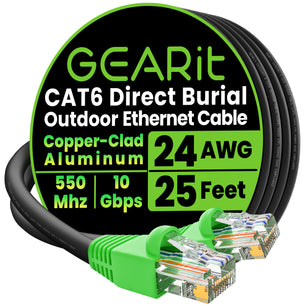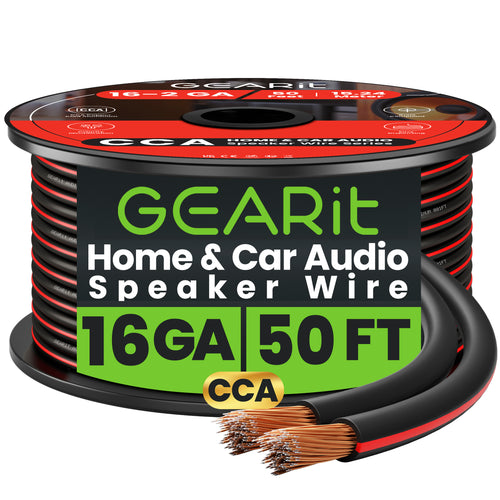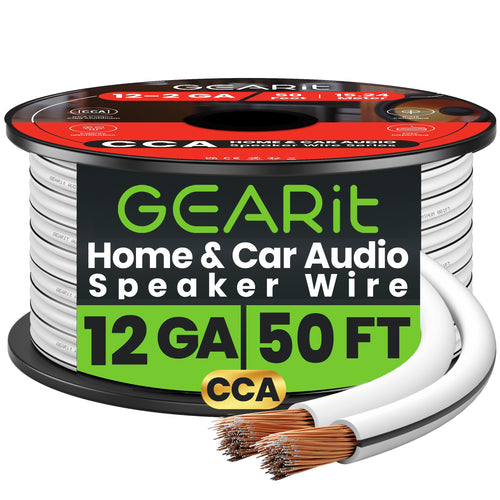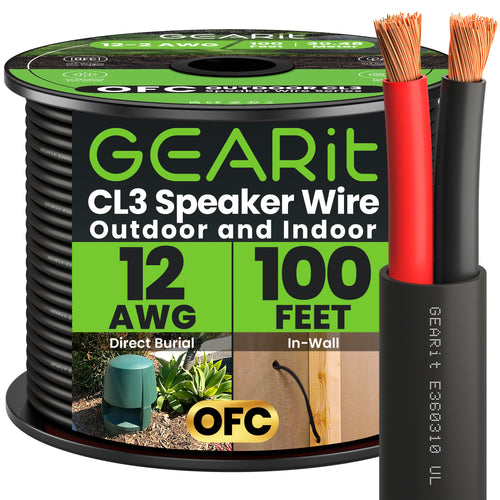Copper-clad aluminum (CCA) cables are lighter and more affordable, ideal for budget-friendly setups, while Oxygen-Free Copper (OFC) cables provide better conductivity and durability for premium audio and electrical performance. Choose based on your needs and budget.
Looking for the best CCA or OFC electrical cables? GearIT has you covered:
Shop GearIT now for top-quality cables that suit your audio and electrical needs! ⚡🔌

Copper Clad Aluminum (CCA) and Oxygen-Free Copper (OFC) are two types of wires commonly used in various applications such as electrical wiring, audio equipment, and telecommunications. These two wires have unique properties that make them suitable for different situations. This article aims to provide a comprehensive guide that will help readers choose the right wire for their project.
CCA Wire
Copper Clad Aluminum (CCA) wire is an electrical wire made with an aluminum core that is coated or clad in copper. The aluminum core is used to reduce the cost of the wire, while the copper cladding provides the necessary electrical conductivity and durability. CCA wire is commonly used in a variety of applications, including wiring for automobiles, appliances, and electronic devices.
Pros of CCA Wire:
- • One of the most significant advantages of CCA wire is its price. CCA wire is significantly cheaper than OFC, making it an affordable option for projects with a tight budget. This makes it an ideal choice for small-scale projects where cost is a major factor.
- • CCA wire is also lightweight and flexible, making it easy to work with and install. This property makes it an excellent choice for projects that require a lot of bending and shaping.
Cons of CCA Wire
- • One of the major drawbacks of CCA wire is its lower conductivity than OFC. This means that it is not as efficient at transmitting electrical current. In some applications, this can result in a loss of signal quality and power. For instance, if you are using CCA wire in audio equipment, you may notice that the sound quality is not as good as when using OFC wire.
- • CCA wire is also not as durable as OFC, and is more prone to breaking or bending. It may not be suitable for applications that require a lot of physical stress.
- • Some audio enthusiasts consider CCA as inferior in audio transmission, compared to OFC. They argue that CCA wire cannot provide the same level of clarity and detail as OFC wire.
OFC Wire
Oxygen-Free Copper (OFC) wire is made entirely of copper and does not have an aluminum core. Copper is a highly conductive metal and is widely used in electrical wire and cable due to its excellent electrical and mechanical properties. Copper wire is typically more expensive than CCA wire, but it is also generally more durable and has a longer lifespan.
Pros of OFC Wire
- • One of the most significant advantages of OFC wire is its higher conductivity than CCA wire. This means that it is more efficient at transmitting electrical current. This results in a clearer and stronger signal in audio and telecommunications applications.
- • OFC wire is also more durable and resistant to breakage and bending than CCA wire. This makes it an ideal choice for applications that require a lot of physical stress.
- • Some audio enthusiasts consider OFC wire as the best option for audio transmission. They argue that OFC wire can provide a higher level of clarity and detail in sound than CCA wire.
Cons of OFC Wire
- • One of the major drawbacks of OFC wire is its price. OFC wire is significantly more expensive than CCA wire. This may make it less accessible for some projects, especially those with a tight budget.
- • OFC wire is also heavier and less flexible than CCA wire. This makes it more difficult to work with and install, especially in projects that require a lot of bending and shaping.
Choosing the Right Wire for Your Project
There are several factors when it comes to choosing the correct wire for your project, this include the application of the wire, the budget of the project, and the level of importance of signal quality. Here are some things to consider when choosing between CCA and OFC wire:

Audio Equipment Applications
When it comes to audio equipment, the choice between CCA and OFC can be especially important. The audio industry is known for its high standards of sound quality and fidelity, and the type of wire used can make a significant difference in the overall performance of the equipment.
Many audio enthusiasts consider OFC to be the superior option for audio transmission due to its higher conductivity and durability. The improved conductivity of OFC means that it can transmit electrical current more efficiently, resulting in a clearer and more accurate sound signal. In addition, the increased durability of OFC means that it is less likely to break or degrade over time, ensuring a longer lifespan for audio equipment.
In contrast, some audio professionals and enthusiasts believe that CCA wire is not suitable for audio applications due to its lower conductivity and potentially lower quality sound transmission. CCA may also be more prone to interference and signal loss, resulting in a less clear and less accurate sound signal.
However, it is important to note that the choice between CCA and OFC wire for audio applications may also depend on other factors, such as the quality of the audio equipment and the specific needs of the project. In some cases, CCA wire may be a suitable option for lower-end equipment or for applications where cost is a significant factor.
Electrical Applications
Both CCA and OFC wire are commonly used in other applications, such as electrical wiring and telecommunications. The choice between the two types of wire may depend on a variety of factors, such as the budget of the project, the specific requirements of the application, and the desired lifespan of the wire.
Overall, the choice between CCA and OFC wire will depend on a variety of factors and should be carefully considered based on the specific needs and requirements of the project. While CCA wire may be a more affordable option, it may not be suitable for applications that require higher conductivity and durability. On the other hand, while OFC wire may be more expensive, it may provide improved performance and a longer lifespan, making it a better long-term investment.
Conclusion
Choosing the right wire for your project can have a significant impact on the performance and longevity of your electrical or audio system. Copper Clad Aluminum (CCA) and Oxygen-Free Copper (OFC) wires are two popular types of wire with their own unique advantages and disadvantages. When you are choosing the wire for your project, it's important to consider the intended use, budget, industry standards, and other factors that may impact the performance and longevity of the wire.



























































